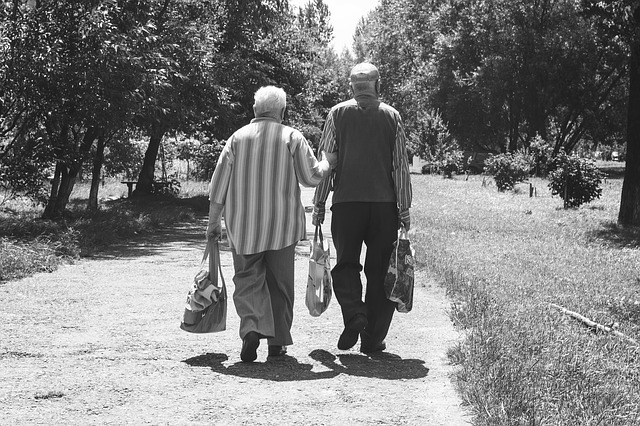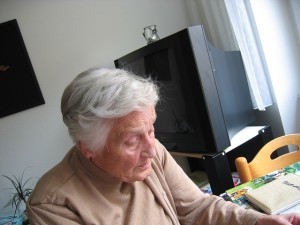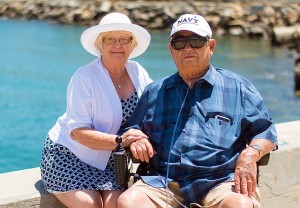- Calls to this hotline are currently being directed to Within Health, Fay or Eating Disorder Solutions
- Representatives are standing by 24/7 to help answer your questions
- All calls are confidential and HIPAA compliant
- There is no obligation or cost to call
- Eating Disorder Hope does not receive any commissions or fees dependent upon which provider you select
- Additional treatment providers are located on our directory or samhsa.gov
Losing a Spouse and the Influence of Eating Disorders in the Elderly Adult

Contributor: Jennifer Rollin, MSW, LGSW, writer for Eating Disorder Hope
Eating disorders are commonly stereotyped, as being illnesses that only affect adolescents-however this is entirely false. The reality is that eating disorders do not discriminate based on age, gender, social class, etc.
Vivian Hanson Meehan, founder of the National Association of Anorexia Nervosa and Associated Disorders, exemplified this point when she discussed how eating disorders are often seen as something that only affects young females. [1]
However, Holly Grishkat, Phd, site director of The Renfrew Center in PA, explained that, “The ‘new’ face of eating disorders is younger, older, and more diverse.” Griskhat went on to describe that eating disorders impact people who are a variety of ages, and those who are suffering do not fall into any one specific category of race, gender, religion, or social class. [2]
Elderly adults who are struggling with eating disorders may present with some unique challenges. Grishkat discussed how some older individuals with eating disorders may have been struggling since their teenage years, which can make their illness more challenging to treat. Grishkat stated, “After 30 years, the eating disorder has become almost a personality characteristic for these women, as many of them define themselves by the eating disorder.” [3]
Different Triggers for Different Ages
 Additionally, triggers and stressors that for elderly adults who are struggling with eating disorders may differ from the kind of stressors that often impact younger adults with eating disorders.
Additionally, triggers and stressors that for elderly adults who are struggling with eating disorders may differ from the kind of stressors that often impact younger adults with eating disorders.
Griskat stated, “The triggers differ for younger vs. older women in that older women are dealing a lot more with issues of loss and grieving…So while younger, the women may have been dealing with the transition from high school to college or from childhood to adulthood, older women’s stressors include such things as empty nest, divorce, loss of parents, widowhood, retirement, chronic illness/disability, death of an adult child, and growing old.” [4]
Loss of A Loved One
Losing a spouse is one major life event that can contribute to or exacerbate eating disorder symptomology among elderly adults. Stanley Dudrick, MD, exemplified this point when he stated that one major trigger for elderly individuals struggling with eating disorders is the “loss of a loved one, especially the person who prepared and shared meals, (which) may induce feelings of isolation and loneliness.” [5]
 For an elderly individual, refusing food or engaging in other disordered behaviors may be one way for them to gain a false sense of control over their life-or may even be a means of passive suicide. [6]
For an elderly individual, refusing food or engaging in other disordered behaviors may be one way for them to gain a false sense of control over their life-or may even be a means of passive suicide. [6]
Additionally, when an elderly individual’s life stressors seem to outweigh their coping skills-they may turn to negative coping strategies, such as engaging in disordered eating behaviors. [7] Eating disorders are complex illnesses, which are caused by a combination of genetic and environmental influences/stressors, therefore it makes complete sense that the loss of a spouse could trigger or exacerbate eating disorder symptoms.
Grief, loss, isolation, and coping with this major change can all lead to elderly adults feeling out of control and thus may trigger them to utilize eating disordered behaviors-as this might provide them with a false sense of control.
Considerations for Elderly Adults
Eating disorder treatment often consists of similar components; regardless of the age of the client-however there are some special considerations to take into account regarding eating disorders in elderly adults. Potential issues or considerations that may apply to elderly adults include the following:
- Concurrent medical illnesses could serve to further complicate an eating disorder diagnosis and treatment.
- For an elderly individual, their family often consists of a partner and children, rather than parents.
- Elderly individuals are often taking a variety of medications and thus this must be factored into their treatment.
- Cognitive impairment (i.e. dementia) must be taken into account and could limit the therapeutic options available.
- Elderly individuals may be taking medications that have the side effect of appetite reduction.
- Vision or hearing loss/impairment could make treatment more challenging and should be taken into consideration. [8]
While elderly adults may have unique factors and stressors to take into account in regards to eating disorder treatment and recovery-ultimately there is still hope for healing. It is important that the signs of eating disorders among elderly adults are not ignored and that family members, physicians, and other treatment professionals are aware of the ways in which eating disorders might manifest in elderly individuals.
For instance, if an elderly adult has recently had significant changes in their weight that might be one red flag-however it is important to rule out other medical conditions and medication side effects. [9]
Ultimately, it is important to note that full recovery from an eating disorder is entirely possible-no matter what age you are. Eating disorders are not a choice-but it is never too late to choose recovery.
Community Discussion – Share your thoughts here!
What has been your experience with eating disorders in the elderly? How can we bring more awareness to this issue?
 About the author: Jennifer Rollin, MSW, LGSW is a therapist, body-image activist, and writer who specializes in working with adolescents, body image concerns, survivors of trauma, and mood disorders. Jennifer is a blogger for The Huffington Post and Psychology Today, as well as a contributing writer for Eating Disorder Hope. For body-positive, self-love, inspiration, “like” her on Facebook at Jennifer Rollin, MSW, LGSW.
About the author: Jennifer Rollin, MSW, LGSW is a therapist, body-image activist, and writer who specializes in working with adolescents, body image concerns, survivors of trauma, and mood disorders. Jennifer is a blogger for The Huffington Post and Psychology Today, as well as a contributing writer for Eating Disorder Hope. For body-positive, self-love, inspiration, “like” her on Facebook at Jennifer Rollin, MSW, LGSW.
References
[1]: Schaeffer, J. (n.d.) Elder eating disorders surprising new challenges. Retrieved from http://www.todaysgeriatricmedicine.com/news/exclusive_0409_03.shtml[2]: Schaeffer, J. (n.d.) Elder eating disorders surprising new challenges. Retrieved from http://www.todaysgeriatricmedicine.com/news/exclusive_0409_03.shtml
[3]: Schaeffer, J. (n.d.) Elder eating disorders surprising new challenges. Retrieved from http://www.todaysgeriatricmedicine.com/news/exclusive_0409_03.shtml
[4]: Schaeffer, J. (n.d.) Elder eating disorders surprising new challenges. Retrieved from http://www.todaysgeriatricmedicine.com/news/exclusive_0409_03.shtml
[5]: Dundrick, S. (2013). Older clients and eating disorders. Retrieved from http://www.todaysdietitian.com/newarchives/110413p44.shtml
[6]: Rosen, N. (2010). Anorexia nervosa in the elderly. Retrieved from http://www.eatingdisordersrecoverytoday.com/anorexia-nervosa-in-the-elderly/
[7]: McIntosh, J. (2015). Older people and eating disorders: not just a teenager’s problem. Retrieved from http://www.medicalnewstoday.com/articles/290023.php
[8]: Tetyana (n.d.) Eating disorders in the elderly. http://www.scienceofeds.org/2013/03/30/eating-disorders-in-the-elderly/
[9]: Cooper, C. (2013). Eating disorders among the elderly. Retrieved from: http://www.armisteadinc.com/news/eating-disorders-elderly/
The opinions and views of our guest contributors are shared to provide a broad perspective of eating disorders. These are not necessarily the views of Eating Disorder Hope, but an effort to offer discussion of various issues by different concerned individuals.
We at Eating Disorder Hope understand that eating disorders result from a combination of environmental and genetic factors. If you or a loved one are suffering from an eating disorder, please know that there is hope for you, and seek immediate professional help.
Last Updated & Reviewed By: Jacquelyn Ekern, MS, LPC on January 31, 2016
Published on EatingDisorderHope.com

The EatingDisorderHope.com editorial team comprises experienced writers, editors, and medical reviewers specializing in eating disorders, treatment, and mental and behavioral health.

